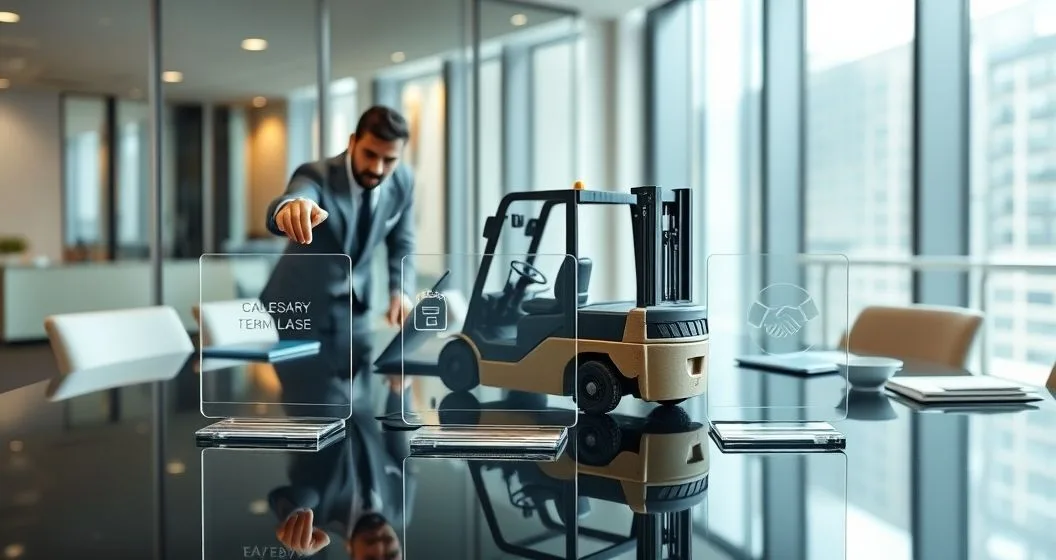Overview
When a business needs equipment—machinery, computers, medical devices, or vehicles—you can either buy it outright, borrow to buy, lease it, or arrange a rent‑to‑own deal. Each path changes cash flow, balance‑sheet treatment, tax consequences, and operational flexibility. Use the choice that aligns with how long you expect to use the asset, your cash runway, and whether owning the asset helps or hampers the business.
Quick comparison
- Lease: Lower upfront cash; typically treated as an expense (operating leases) and may offer maintenance bundles. Good for short‑use or fast‑obsolescence assets.
- Loan: You own the asset immediately; payments reduce cash but you can claim depreciation and interest deductions. Best when you expect long useful life and residual value.
- Rent‑to‑own: Hybrid — start with rental payments and convert to ownership later. Useful for tight budgets that expect eventual ownership.
How to decide (step‑by‑step)
- Forecast useful life and obsolescence risk. If technology will be outdated in 2–3 years, leasing usually wins.
- Model cash flow. Compare total cost of ownership (payments + maintenance + disposal) vs. available cash and borrowing capacity.
- Check tax impacts. Lease payments are often deductible as ordinary business expenses; purchased equipment is depreciated (see IRS Publication 535 and Publication 946). Always confirm treatment with your tax advisor. (IRS: https://www.irs.gov/publications/p535, https://www.irs.gov/publications/p946)
- Consider balance‑sheet and credit effects. Loans increase liabilities but add an owned asset; leases may be off‑balance (operating lease) or on‑balance (capital/finance lease) depending on terms and accounting standards.
- Compare vendor offers for service, warranties, and end‑of‑term options (purchase price, return, or upgrade).
When a lease makes sense
- You need the equipment for a predictable but limited time.
- You want lower initial cash outlay and a predictable monthly expense.
- You prefer vendor‑provided maintenance and upgrades.
When a loan makes sense
- You plan to use the equipment for most of its useful life and expect residual value.
- You want to build equity in the asset and take advantage of depreciation and interest deductions.
- Your business can support the debt service without stressing working capital.
When rent‑to‑own makes sense
- You lack capital today but expect future cash to complete the purchase.
- You want to test equipment in your operation before committing to buy.
Tax and accounting notes
- Lease payments: Often deductible as business expenses for operating leases, but confirm classification and local accounting rules. See IRS guidance and consult your tax professional (IRS Publications linked above).
- Purchased equipment: You generally depreciate the cost over its recovery period; Section 179 and bonus depreciation rules can accelerate deductions for qualifying property (IRS Publication 946).
- Paperwork: Loans typically require a promissory note and equipment lien; leases use a lease agreement that specifies maintenance, insurance, and end‑of‑term options.
Practical examples
- Construction contractor: Buys heavy machinery with a five‑year loan because the machines retain value and are core to operations.
- Tech startup: Leases high‑end laptops on a three‑year schedule to keep hardware current and avoid large cash outlays.
- Small retail shop: Uses a rent‑to‑own plan for POS hardware when credit limits prevent a loan.
Common mistakes to avoid
- Comparing only monthly payments. Always calculate total cost (principal+interest, fees, maintenance, early‑termination penalties, and residuals).
- Ignoring maintenance responsibilities or insurance requirements in a lease.
- Assuming all leases are off‑balance or always deductible—classification rules matter.
Professional tips
- Get multiple quotes and ask for a full cost worksheet showing fees, residuals, and buy‑out options.
- Negotiate service and upgrade terms into a lease if equipment uptime is critical.
- If tax deductions matter this year, ask your tax advisor about Section 179 and bonus depreciation before choosing buy vs. lease.
Further reading and internal resources
- Learn detailed differences between ownership and leasing on our page: Equipment Financing vs Leasing: Cost, Taxes, and Flexibility (https://finhelp.io/glossary/equipment-financing-vs-leasing-cost-taxes-and-flexibility/).
- For loan repayment structures and when a loan fits, see Equipment Loans for Growing Businesses: Structuring Repayment (https://finhelp.io/glossary/equipment-loans-for-growing-businesses-structuring-repayment/).
- Beginner’s overview: Equipment Financing 101 for Small Businesses (https://finhelp.io/glossary/equipment-financing-101-for-small-businesses/).
Authoritative sources
- IRS Publication 535, Business Expenses: https://www.irs.gov/publications/p535
- IRS Publication 946, How To Depreciate Property: https://www.irs.gov/publications/p946
- Consumer Financial Protection Bureau—general guidance on financing: https://www.consumerfinance.gov
- U.S. Small Business Administration—loan programs: https://www.sba.gov/funding-programs/loans
Disclaimer
This article is educational and does not replace personalized tax or legal advice. For decisions that affect taxes, accounting, or long‑term capital strategy, consult your CPA or financial adviser.



